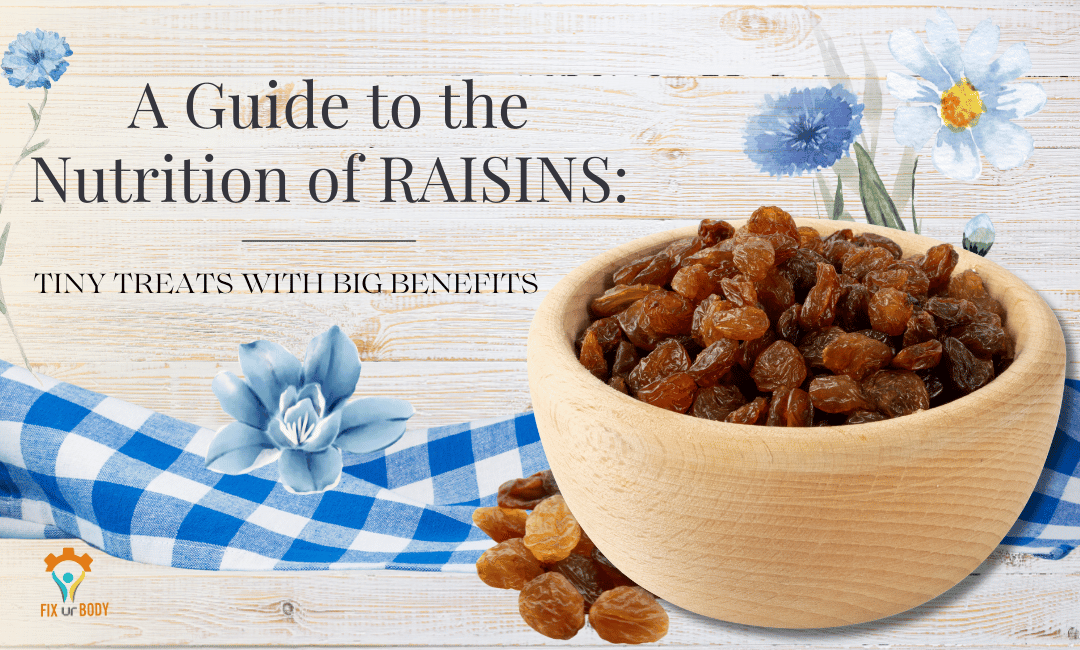Hey there! Let’s discuss the nutrition of raisins, one of the snack world’s unsung heroes. Yep, those little dried-up grapes that seem to linger at the back of your pantry, waiting for their moment to shine. Well, it turns out they’re not just for baking cookies or gathering dust. Raisins are little nuggets of nutrition and sweetness that can do wonders for your health.
Imagine a snack that’s irresistibly sweet and brimming with health benefits. Raisins are just that. They’re a concentrated energy source, making them a perfect pick-me-up snack. Let’s dive into the nutrition of raisins and why you should give them a little more love.
Table of Contents
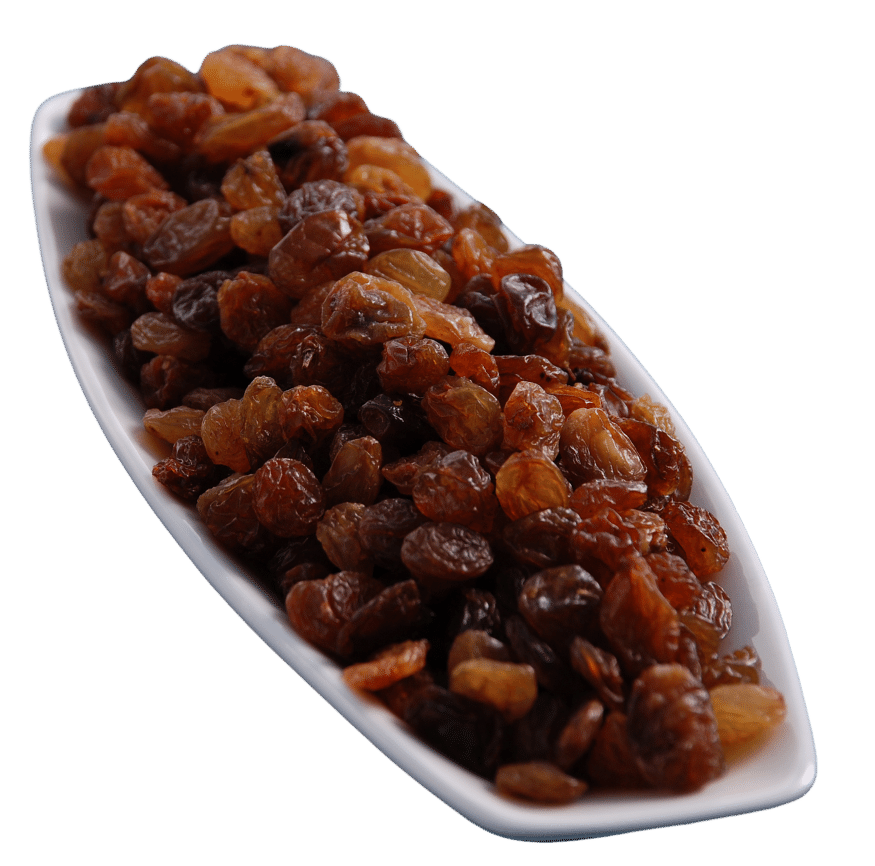
The Profile of Raisins:
In a world where dietary trends come and go, raisins stand the test of time as a nutritious, delicious, and versatile snack. They remind us that the simplest foods can sometimes offer the most profound health benefits. This humble dried fruit, stemming from the dehydration of grapes, is a powerhouse of nutrients. Whether you’re a fitness enthusiast, someone looking to improve your dietary habits, or simply curious about the benefits of raisins, this guide is tailored to offer valuable insights.
The History of Raisins:
The journey of raisins from vine to snack is a tale woven through centuries, cultures, and continents, illustrating humanity’s ingenuity in preserving the bounty of nature for enjoyment throughout the year. The story begins over 6,000 years ago. Imagine ancient vineyards under a blazing sun, where grapes began their transformation, quite by accident. It’s believed that people first discovered raisins when they came across grapes that had naturally dried on the vine.
Raisins in the Ancient World
Raisins were a prized commodity in the ancient world, treasured for their sweetness and longevity. The Egyptians adorned their places of worship with raisins and even included them in tombs for the afterlife, believing in their sustaining powers. They were also consumed for energy by athletes in the Olympic Games and by Roman soldiers as a compact, durable source of nourishment during long campaigns.
As civilizations expanded, so did the cultivation of grapes for raisins. Vineyards were established throughout the Mediterranean and Middle East. The Moors then brought raisins to Spain and from there spread to the rest of Europe, becoming a coveted item in the Middle Ages, used as sweeteners, decorations, and even as currency.
Raisins in the New World
The exploration and colonization of the New World opened a new chapter in the history of raisins. Spanish missionaries introduced grapes to California in the 18th century. The warm, sunny valleys provided an ideal environment for drying grapes into raisins. This marked the beginning of the United States becoming a leading producer and innovator in the raisin industry.
Today, raisins are enjoyed worldwide, with the United States, Turkey, Iran, and Greece leading in production. The process of making raisins has been refined over time, involving careful cultivation of grape varieties best suited for drying, precise timing of harvesting, and modern drying techniques that ensure quality and efficiency. Yet, the essence of raisin production remains true to its ancient roots—capturing and concentrating the sun’s warmth and the grape’s sweetness.
The Nutrition of Raisins:
Raisins are like grapes that hit fast-forward on life, drying out in the sun or in dehydrators until they shrivel up into their wrinkly selves. But what they lose in water, they gain in concentration—of sugars, nutrients, and fiber. They’re a sweet source of energy, vitamins (especially those Bs), minerals like potassium and iron, and they pack a decent amount of fiber to keep your digestive system on track.
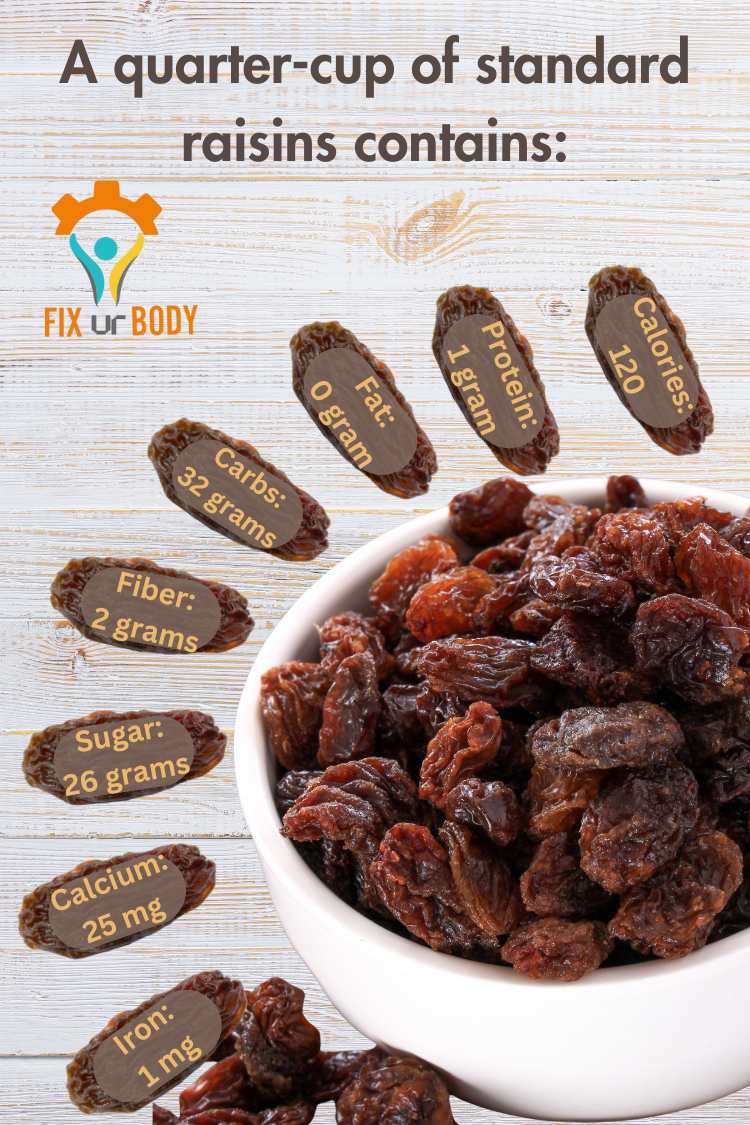
Let us clarify the nutrition of raisins in some points:
Sugar and Calories
A 1 quarter cup of standard raisins has 26 grams of sugar and about 120 calories. That is why raisins aren’t exactly a low-calorie, or low-sugar treat. Therefore, you need to pay attention to the amount of raisins you are taking.
However, these natural sugars are a good energy source, especially for athletes, as they replace expensive sports chews and gels. A 2011 study shows that because of the nutrition of raisins, they are as effective as sports jelly beans in improving performance for athletes in moderate- to high-intensity endurance exercise.
Fiber
Raisins can keep things moving smoothly in the digestive department, thanks to their fiber content. They can make the stool softer and prevent constipation as well as they can serve in the gut health as probiotics can do. You can earn 2 grams of fiber in a quarter cup of raisins.
Fibers are known for their effect in decreasing the level of LDL type of cholesterol and offering you a feeling of full stomach. Thus, they can help a lot in weight management. You can read here about the simple ice method for losing weight.
Vitamins and Minerals
From the B vitamins to potassium and iron, raisins are like nature’s multivitamin.
- Iron: Many of raisins benefits may be due to its richness in iron. Iron is needed for growth and development. It helps produce hemoglobin, which carries oxygen in red blood cells from the lungs to all parts of the body, and myoglobin, a protein that provides oxygen to muscles. Your body also needs iron to make some hormones. The average daily recommended amounts of iron are listed below in mg.
| Life Stage | Recommended Amount |
|---|---|
| Birth to 6 months | 0.27 mg |
| Infants 7–12 months | 11 mg |
| Children 1–3 years | 7 mg |
| Children 4–8 years | 10 mg |
| Children 9–13 years | 8 mg |
| Teen boys 14–18 years | 11 mg |
| Teen girls 14–18 years | 15 mg |
| Adult men 19–50 years | 8 mg |
| Adult women 19–50 years | 18 mg |
| Adults 51 years and older | 8 mg |
| Pregnant teens | 27 mg |
| Pregnant women | 27 mg |
| Breastfeeding teens | 10 mg |
| Breastfeeding women | 9 mg |
- B-vitamins: The nutrition of raisins show that they are rich in B vitamins. These vitamins are essential for energy metabolism and maintaining healthy skin and hair.
- Other Minerals: Raisins are a great source of potassium, magnesium, phosphorus, calcium and boron. These minerals are important for our overall health. Calcium, for example, is essential for healthy and strong bones and teeth and helps prevent the development of osteoporosis in postmenopausal woman.
Antioxidants
Raisins are an exceptional source of naturally occurring chemicals called flavonoids and phenolic acids, which combat oxidative stress and reduce inflammation. Antioxidants, in general, help prevent diseases like cancer, heart disease, and stroke.
Raisins Benefits:
The nutrition of raisins, those deceptively simple dried fruits, offers a range of health benefits that might just make you see these tiny treasures in a new light. Let’s dive deeper into the health benefits you can reap from making raisins a regular part of your diet.
1. Digestive Health
The fiber found in raisins is a boon for anyone looking to improve their digestive health. This natural source of soluble and insoluble fiber is essential for maintaining regular bowel movements, thus preventing the discomfort of constipation. But the benefits extend further; by promoting a healthy digestive system, the fiber in raisins also supports the growth of beneficial gut bacteria. This contributes to overall gut health, which is linked to a myriad of health outcomes including improved immunity and a reduced risk of chronic disease.
2. Heart Health
Raisins are rich in potassium, a mineral that plays a critical role in cardiovascular health. Potassium helps to lower blood pressure by counteracting the effects of sodium and easing tension in the blood vessel walls. This not only reduces the strain on the heart but also decreases the risk of stroke and heart disease. Additionally, the antioxidants in raisins, particularly phenolic compounds, may contribute to heart health by reducing oxidative stress and inflammation, further protecting cardiovascular health.
3. Weight Management
Despite their natural sweetness, raisins have a relatively low to medium glycemic index (GI), which measures how quickly foods raise blood sugar levels. Foods with a low GI are beneficial for blood sugar control and can be particularly helpful for individuals managing diabetes or those trying to maintain a healthy weight. The fiber in raisins also plays a role here, as it provides a sense of fullness, reducing overall calorie intake by curbing the appetite between meals. This combination of low GI and high fiber makes raisins an excellent snack for weight management goals.
4. Bone Health
Raisins may be small, but they’re mighty regarding bone health. The benefit of raisin to bones lies in the fact that they contain calcium, essential for maintaining strong bones and teeth, and boron. This trace mineral enhances calcium absorption and bone formation. This dynamic duo works together to support skeletal health, potentially reducing the risk of osteoporosis and fractures. The magnesium found in raisins also supports bone density, providing another support layer for strong, healthy bones.
5. Anemia Prevention
Iron deficiency is a common cause of anemia, a condition characterized by a lack of healthy red blood cells to carry adequate oxygen to the body’s tissues. Raisins, being a good source of iron, can contribute to the prevention and treatment of anemia by boosting the production of red blood cells. Furthermore, the vitamin C in raisins enhances iron absorption, making the iron in raisins more bioavailable. This is particularly beneficial for vegetarians and vegans who might find it challenging to meet their iron needs through plant-based sources alone.
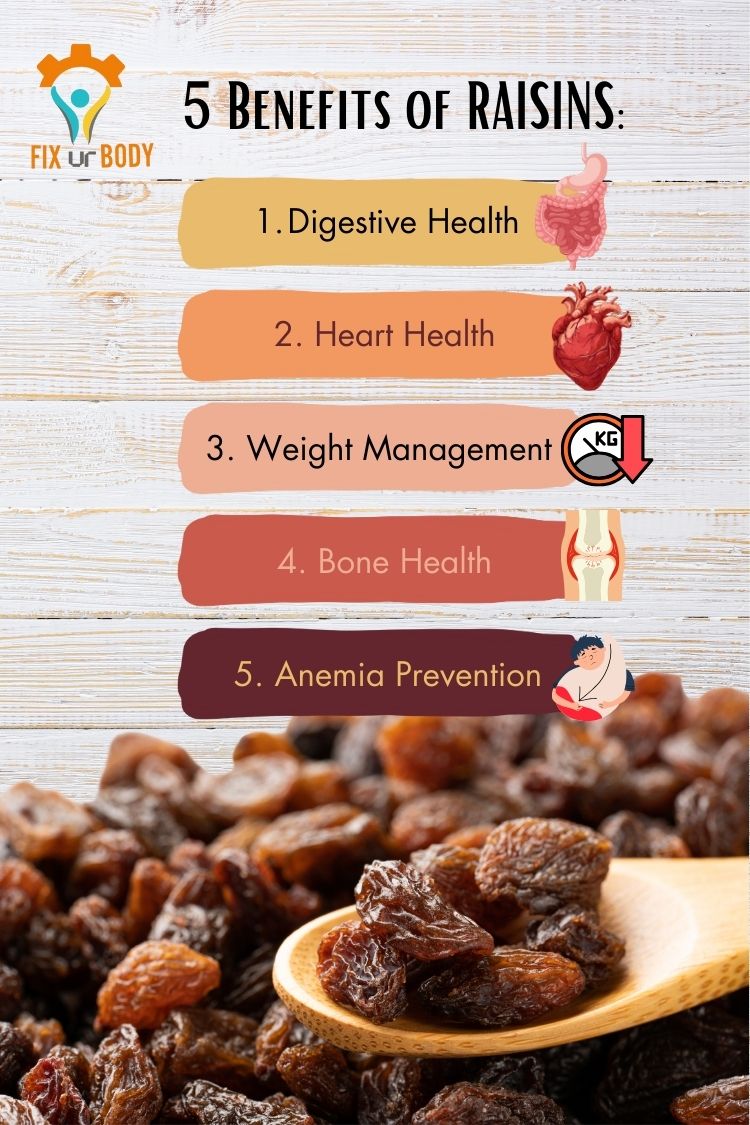
How to Use Raisins in Your Daily Life?
The nutrition of raisins makes them a fantastic addition to your daily diet. From enhancing your meals to boosting your health, let’s dive into how you can incorporate raisins into your daily life, making each day a bit sweeter and healthier.
Sweetening Your Breakfast
Start your day on a sweet note by acquiring the benefit of raisin and adding it to your breakfast. Here are a few ideas to incorporate them into your morning routine:
- Oatmeal and Cereals: Sprinkle a handful of raisins on your oatmeal or cereal for a natural sweetener that also adds a textural contrast.
- Smoothies: Blend them into your morning smoothie for a touch of sweetness and a fiber boost.
- Yogurt Parfaits: Layer yogurt with fruits, granola, and raisins for a delicious and nutritious parfait.
- Pancakes and Waffles: Mix raisins into the batter, or use them as a topping for an extra burst of sweetness.
Elevating Main Dishes
Raisins can also add complexity and a hint of sweetness to savory dishes:
- Salads: Toss them into a mixed greens salad with nuts and feta cheese for a play on flavors and textures.
- Rice Dishes: Incorporate raisins into rice pilafs or couscous to add sweetness and depth.
- Stews and Curries: Their sweetness can balance the spice in stews, curries, and meat dishes, offering a surprising layer of flavor.
A Healthy Snack Alternative
Raisins are the perfect on-the-go snack. They’re portable, non-perishable, and packed with energy. Keep a small box in your bag or desk drawer for a quick and healthy snack to curb your hunger or give you a quick energy boost during the day.
Baking and Desserts
Raisins can transform baked goods and desserts by adding natural sweetness and moisture:
- Cookies and Breads: Add them to cookies, breads, and muffins for a moist texture and a burst of sweetness.
- Puddings and Pies: Use them in puddings, pies, and other desserts where their chewy texture and sweetness can shine.
Natural Sweetener
Raisins can be a natural sweetener for various dishes. Blend them into a paste and use it as a sweetening agent in sauces, dressings, and marinades. This not only adds sweetness but also increases the nutritional content of your dishes.
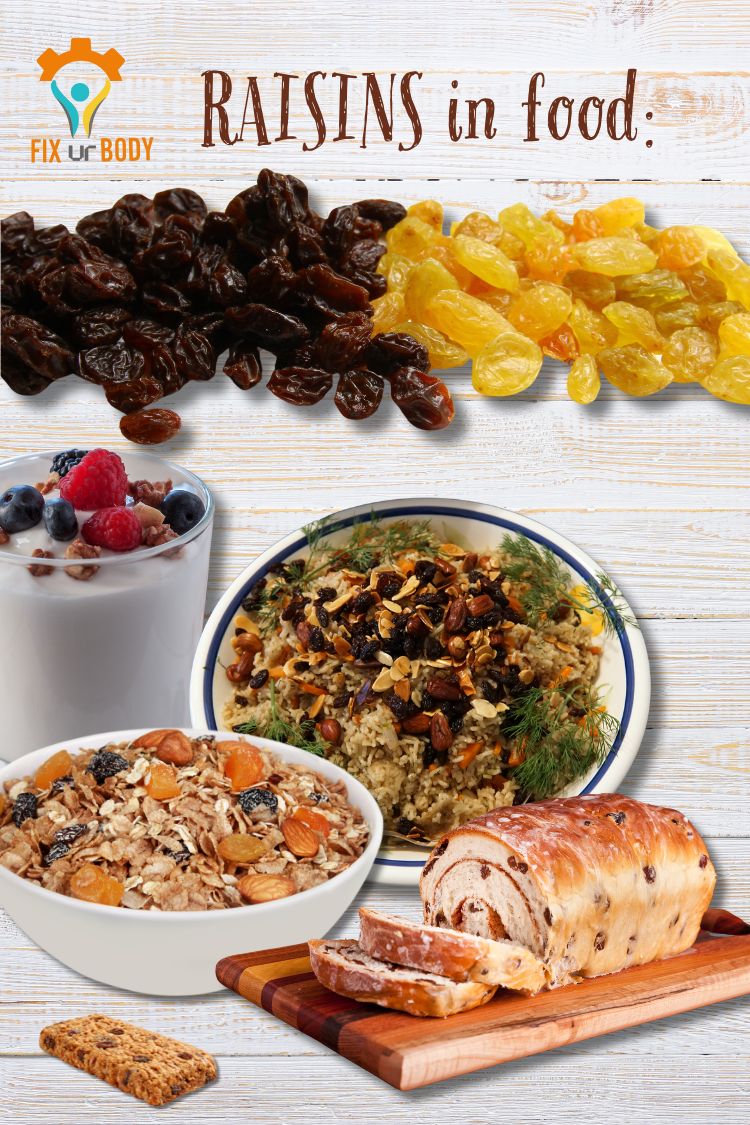
Conclusion: A Versatile Companion in Your Culinary Journey
Because of the nutrition of raisins, incorporating them into your daily life can add not just nutritional value but also a touch of sweetness and complexity to your meals. Whether you’re looking to enhance your breakfast, elevate your main dishes, find a healthy snack, or add a natural sweetener to your cooking, raisins offer a versatile solution. Let these tiny treasures inspire you to create healthier, more flavorful, and enjoyable meals every day.
Remember, it’s the small changes that can make a big difference in your lifestyle. So why not start by exploring the sweet and nutrition of raisins? Your body—and your taste buds—will thank you.


